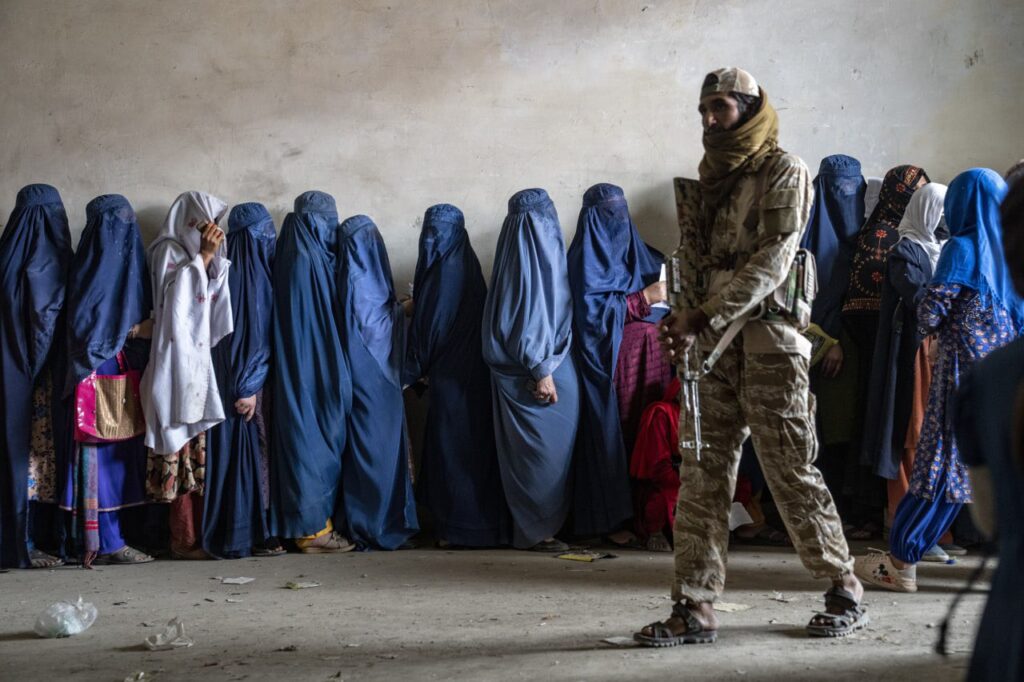
The UN Security Council strongly condemned on Friday the Taliban’s morality law, calling on the international community to use its influence to push for an immediate reversal of policies that target Afghan women.
Twelve out of 15 UN Security Council members condemned “in the strongest terms” the Taliban’s systemic gender discrimination and oppression of women and girls in Afghanistan. China, Russia and Algeria did not back the statement of condemnation.
The council’s condemnation follows a recent decree by Taliban supreme leader Hibatullah Akhundzada, instructing Afghan women not to speak loudly in public and to cover their entire bodies and faces when outdoors.
A diplomat told The National that Russia and China had said it would be “unfair” to make a judgement on an internal Afghan matter.
“As the vast majority of the council made clear in today’s joint statement, human rights, including those of Afghan women and girls, are fundamental and universal,” the diplomat said.
“They also said the council shouldn’t ‘speak for speaking’s sake’. Today’s statement was about the Council’s duty to speak up for women and girls’ sake in Afghanistan – the importance of which should be obvious.
“Afghanistan will never thrive while half its population is being oppressed.”
The 114-page, 35-article law, announced on August 21, details actions deemed mandatory or prohibited for men and women under the Taliban’s strict interpretation of Sharia.
Women are prohibited from singing or reading poetry aloud. Unrelated men and women are forbidden from looking at each other, and women must cover themselves fully in the presence of non-Muslims.
Men are required to grow beards longer than a fist, wear loose-fitting clothing, and avoid exposing their bodies between the navel and knee. Disobedience to parents is also outlawed.
The morality police, under the Ministry for the Propagation of Virtue and the Prevention of Vice, are responsible for enforcing these rules.
Council members urged the Taliban to swiftly reverse all the policies and practices that restrict women and girls of their human rights and fundamental freedoms.
“The Taliban need to listen and respond to the voices of Afghan women and girls by respecting their rights to education and for women, to work as well as the freedoms of expression and movement,” said Japan’s ambassador to the UN, Yamazaki Kazuyuki, on behalf of the 12 council members.
“It is a prerequisite for a stable, peaceful and prosperous Afghanistan,”
The council members further emphasised that the Taliban’s actions undermine international efforts to engage with them, citing a meeting with UN special envoys in Doha two months ago.
The goal of the meeting was finding ways to achieve peace for Afghanistan and with its neighbours, with the country fully integrated into the international community and meeting global obligations.
Obaidullah Baheer, a lecturer at the American University of Afghanistan – now operating in exile – told The National that Afghans like himself hope international engagement with the country will not be hindered.
“Engagement needs to be angled at helping the Afghan population within the country who are trying to fight for their rights,” he said. “They can only do so when they’re recognised and when they’re supported. And so the solution to Afghanistan’s problems has to come from within Afghanistan.”
Since returning to power three years ago, the Taliban have banned girls over the age of 12 from attending school beyond sixth grade and have limited women’s employment to select sectors, such as health care.
Afghan women are also prohibited from visiting parks and public entertainment spaces, and must be accompanied by a male guardian when travelling by road or air.








